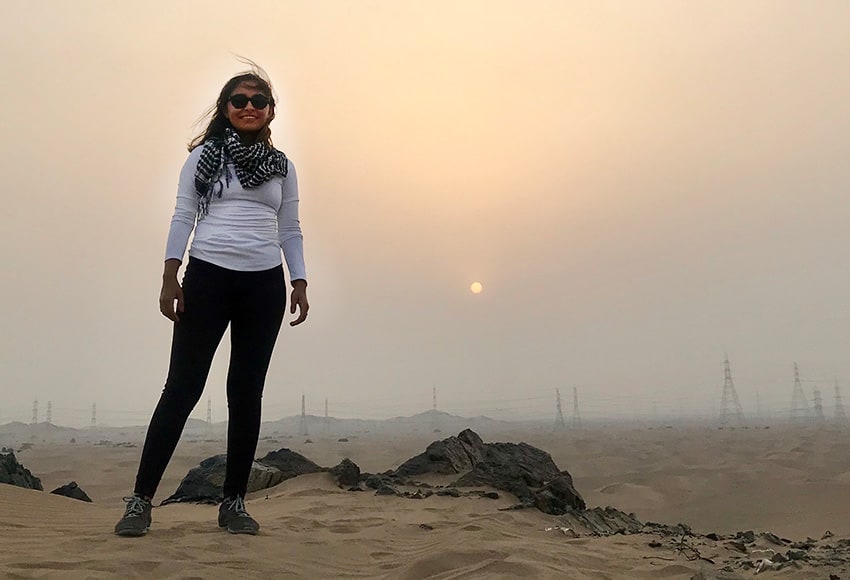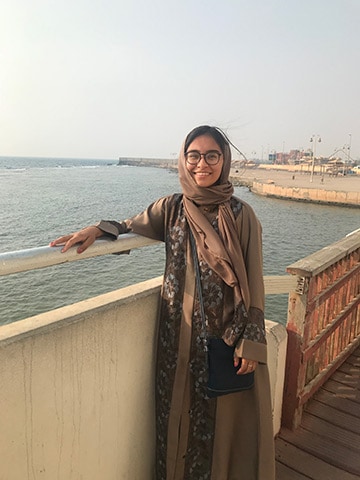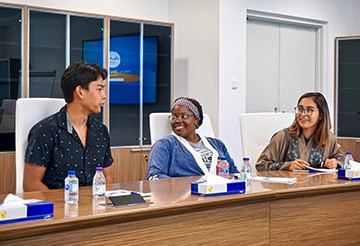Life Lessons from the Trip of a Lifetime: Jacqueline Torres ‘19

Politics major and Nisbet Honors student Jacqueline Torres ’19 spent nine days in Saudi Arabia thanks to a sponsorship from The King Faisal Center for Research and Islamic Studies. She spent those nine days exploring feminism in the Middle East, swimming in the Red Sea and riding a dune buggy through the Arabian Desert.
Read Jacqueline’s firsthand experience in Saudi Arabia
When I was a senior in high school I never imagined I would spend my free time researching Middle Eastern politics and culture, much less attempt to learning how to speak Arabic. The Model Programs team of Converse College has a very rich legacy—If not for my work within Model Programs here, I would have never have experienced such an amazing opportunity.

Model Programs has taught me how to appreciate culture and look beyond the common misconceptions and often over-sensationalized stories on the news or internet. Most importantly, Model Programs prepared me to be a student of the world and seek to learn from others from backgrounds much different than my own.
The National Council on US-Arab Relations offered me an opportunity to participate in Gateway KSA’s program. Gateway KSA is a fully-funded tour of the Kingdom of Saudi Arabia that exposes students and other influencers to the rich history, culture, and scientific progress within the country. I visited Riyadh, Jeddah, and Dammam. I got to meet and discuss several cultural and social topics with scholars, government officials, students, and even a prince. As I write this, the Saudi Government is facing criticism on an international stage. The situation is continuously developing, so I look to instead focus on the culture and the people I interacted with during my trip. I feel privileged to have been invited on such a trip and have been able to explore such a thriving and culturally rich nation.
Growing up in a conservative Mexican-American household, I found that I could relate to a number of cultural aspects of Saudi life. There is a deep reverence for tradition, faith, and family. These components form the backbone of my own family, just as it forms the backbone of Saudi Society. I had the opportunity to listen and converse with a number of Saudi men and women.
I got to meet and discuss several cultural and social topics with scholars, government officials, students, and even a prince.
The King Faisel Center for Research and Islamic Studies hosted my group at their facilities for a number of discussions, including one on women and feminism in Saudi Arabia. This was one of the most notable parts of my trip. Saudi women are well aware of the stigma surrounding them on an international stage. Given this stigma, many, especially the younger generation, are ready to discuss their views on feminism and how it can and does exist within their society. The discussion was led by Dr. Ahlam Mohammed al-Hakmi and Dr. Mody al-Khalaf, members of the Consultative Assembly of Saudi Arabia, or the ‘Shura Council; as it is popularly known. They stressed the importance of viewing and discussing feminism through different cultural lenses.
These women are trail-blazers in their right. I noted the great pride with which they spoke about their country and their culture. They were not afraid to be honest and did not feel the need to soften their statements or aspects of their culture to accommodate the sensibilities of a group of western students like our own. The two women spoke about their family lives and careers and how those two lives coexisted. I noticed they also faced a dilemma many western women face: career goals or family life.

The discussion with two of the female members of the Shura Council gave way to a deeper discussion on feminism. Dr. Mody al-Khalaf made a statement that really made sense in my mind, “There is not a single kind of feminism. Feminism should be discussed in the context of culture”. This is not a conversation I expected to have during my visit to Saudi Arabia, and this mentality I would later notice, is part of the problem.
As a student at Converse College, a women’s college that praises female achievement and empowerment, surely, I would know what feminism is all about, right? Not exactly. As Dr. Mody pointed out, I was only attempting to comprehend what feminism is through the dominant culture lens in my life. I was failing to understand how the concept of feminism can change through a different cultural lens. My encounters with other local women, particularly those of my own age, brought even more clarity. I found that these women had the same goals and aspirations, they just had to develop these goals in a different cultural setting. They did not consider this different cultural setting to be an additional challenge, but rather just an additional component of their identity.
Our Gateway KSA group had a chance to sit and chat over coffee with a group of students from Effat University, a female institution. Many of the students in this encounter had already studied abroad in western nations and had already been exposed to western culture. I wondered how they were able to make such a major cultural transition, and whether they were happy to return. I was surprised to learn that all the women I spoke to were not only happy to return, but felt as if it was their duty. This highlighted, yet again, the importance of family and nation.
Without my participation in Model Arab League, I would have never gotten an opportunity to visit such a unique country
I also had the opportunity to visit and tour ARAMCO and Sabic, two large Saudi Companies who are really pushing the boundaries of innovation. The Kingdom of Saudi Arabia has made several attempts to diversify their economy through the decades, yet they have not been quite able to complete the goal. However, technological developments have made business leaders much more optimistic about successful diversification in the near future. Both ARAMCO and Sabic spoke about their engineering developments and how they hoped to expand even more. Both companies were eager to discuss their incorporation of women into traditionally male-dominated fields in science. The young professionals in Saudi Arabia are very optimistic about their futures.
Without my participation in Model Arab League, I would have never gotten an opportunity to visit such a unique country. My education at Converse College has been key in the development of my appreciation of Middle Eastern culture. I am also thankful to Gateway KSA for providing me such a unique and life-changing experience. I look forward to what the future has in store for the Kingdom of Saudi Arabia.